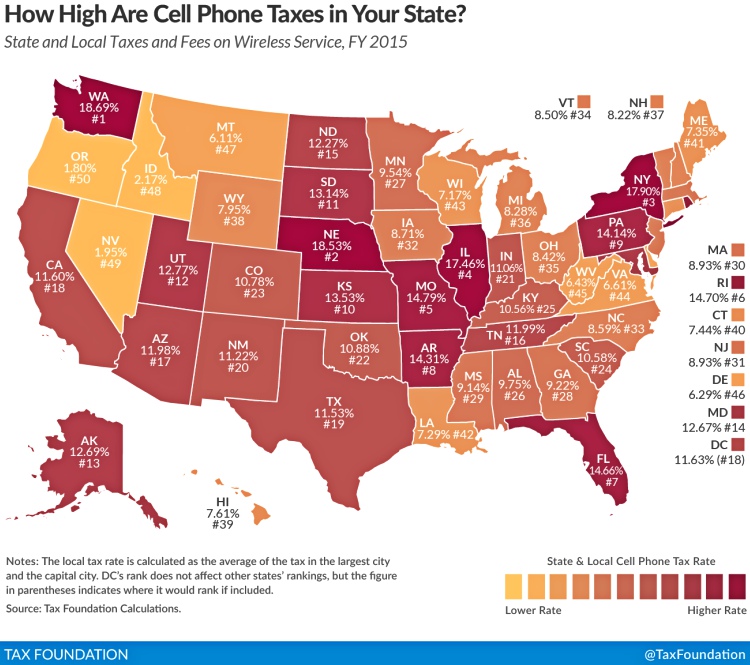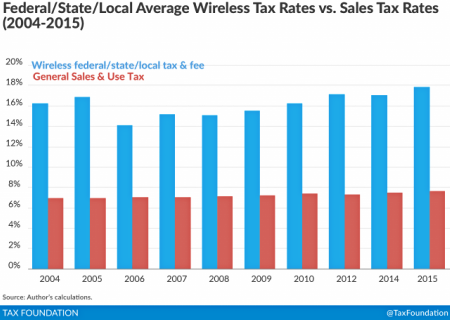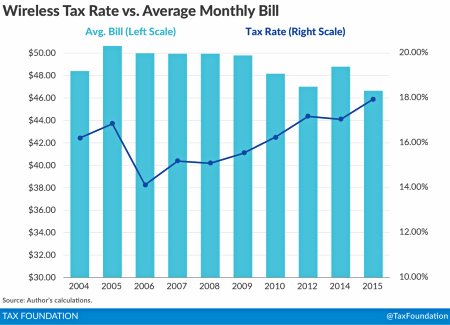 If you live in the U.S., every month you’re paying an average combined rate of nearly 18 percent in combined federal, state, and local wireless taxes and fees on your cell phone bill, according to a new report from the nonpartisan nonprofit the Tax Foundation.
If you live in the U.S., every month you’re paying an average combined rate of nearly 18 percent in combined federal, state, and local wireless taxes and fees on your cell phone bill, according to a new report from the nonpartisan nonprofit the Tax Foundation.
This average wireless taxes rate includes the recently increased 6.46 percent federal rate and an average 11.5 percent state-local rate, according to the foundation. For the most part, the tax rate only includes wireless voice and other taxable services–not wireless internet access.
Annually, that adds up to about $5.8 billion in excessive state and local taxes and fees, and about $5 billion in Federal Universal Service Fund surcharges, according to the Tax Foundation.
Highest and lowest wireless taxes in the U.S.
 According to the report, the five states last year with the highest state-local rates were: Washington State (18.69 percent), Nebraska (18.53 percent), New York (17.9 percent), Illinois (17.46 percent), and Missouri (14.79 percent). And five cities—New York City, Baltimore, Chicago, Omaha, and Seattle—now have effective tax rates in excess of 25 percent of the customer bill.
According to the report, the five states last year with the highest state-local rates were: Washington State (18.69 percent), Nebraska (18.53 percent), New York (17.9 percent), Illinois (17.46 percent), and Missouri (14.79 percent). And five cities—New York City, Baltimore, Chicago, Omaha, and Seattle—now have effective tax rates in excess of 25 percent of the customer bill.
Want to save money on your wireless bill? Consider moving to one of the five states with the lowest state-local rates: Oregon (just 1.80 percent), Nevada (1.95 percent), Idaho (2.17 percent), Montana (6.11 percent), and Delaware (6.29 percent). Or for a less drastic measure, try to cut down on your wireless usage if you aren’t on an all-inclusive plan.
You can see how your state stacks up in the map above.
 If your cell phone taxes and fees seem high, they’re probably higher than what you pay on other goods and services. According to the Tax Foundation, the combined average of U.S. wireless taxes and fees is more than twice that of most other taxable products. That’s because some cash-strapped states and cities have hiked up these taxes and fees to boost revenue.
If your cell phone taxes and fees seem high, they’re probably higher than what you pay on other goods and services. According to the Tax Foundation, the combined average of U.S. wireless taxes and fees is more than twice that of most other taxable products. That’s because some cash-strapped states and cities have hiked up these taxes and fees to boost revenue.
Higher wireless taxes can hurt the poor
Governments need efficient taxes to raise necessary revenue, but the foundation says that there are good reasons for lawmakers to look elsewhere before expanding wireless taxes and fees. For one, cell phones are increasingly the only means of communication and connectivity for many Americans, particularly those struggling to get out of poverty. Secondly, low-income customers don’t usually get breaks on such taxes like they can on their landline phone service.
“Wireless taxes and fees are regressive and have a disproportionate impact on poorer citizens,” said Scott Mackey of KSE Partners and co-author of the report. “Excessive taxes and fees may reduce low-income consumers’ access to wireless service at a time when such access is critical to economic success.”
Higher taxes can slow overall wireless usage
 Consumer demand for wireless service is price sensitive. As cited in the Tax Foundation report, the most recent study on the “price elasticity of demand” for wireless service shows that each 1 percent increase in the price of wireless service reduces consumer demand for wireless service by about 1.2 percent. Multiply that by ten and you see that a difference of 10 percentage points on wireless taxes and fees versus other taxes on other goods and services is suppressing demand for wireless service by almost 12 percent below what it would be if wireless taxes and fees were equal to other goods and services taxes.
Consumer demand for wireless service is price sensitive. As cited in the Tax Foundation report, the most recent study on the “price elasticity of demand” for wireless service shows that each 1 percent increase in the price of wireless service reduces consumer demand for wireless service by about 1.2 percent. Multiply that by ten and you see that a difference of 10 percentage points on wireless taxes and fees versus other taxes on other goods and services is suppressing demand for wireless service by almost 12 percent below what it would be if wireless taxes and fees were equal to other goods and services taxes.
This reduced demand impacts network investment because subscriber revenues ultimately determine how much carriers can afford to invest in network modernization, says the report.
Mobile web taxes could rise, too
According to the Tax Foundation, Congress is considering legislation to extend the federal moratorium on state and local taxes on internet access, including on mobile phones. If the moratorium is not extended, excessive wireless taxes would also be imposed on wireless internet access. This could add significantly to the growing tax burden on consumers, who increasingly rely on wireless devices to access the internet.
You can anguish over the full report, “Record High Taxes and Fees on Wireless Consumers in 2015” right here on the Tax Foundation’s website.





